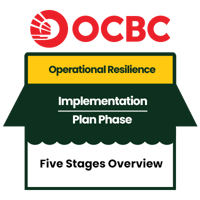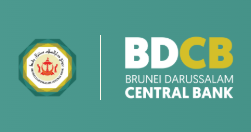 Chapter 17
Chapter 17
Implement Training and Awareness – BDCB's Operational Resilience “Sustain” Phase
Introduction
The strength of Brunei Darussalam Central Bank’s (BDCB) Operational Resilience framework lies not only in its design but also in its ability to be understood, embraced, and practised by all members of the organisation.
As part of the Sustain phase, the Implement Training and Awareness stage ensures that resilience becomes ingrained in the Bank’s culture and daily operations.
Training equips employees with the necessary knowledge and skills to respond effectively to disruptions, while awareness initiatives cultivate a shared sense of accountability for safeguarding critical functions.
By systematically embedding training and awareness into its resilience program, BDCB strengthens its capacity to anticipate, withstand, and recover from operational challenges in line with its mandate of financial stability and public trust.
1. Purpose & Significance
The Sustain phase focuses on embedding resilience into the organisation's culture—ensuring the framework endures beyond its initial design and rollout.
Within this phase, Implement Training and Awareness plays a pivotal role: it ensures staff across all levels understand, support, and actively participate in operational resilience efforts.
Training builds capability, while awareness fosters a culture where resilience is everyone's responsibility.
2. Implementation Steps & Examples
A. Identify Who Should Be Trained
Start by mapping out all roles that touch operational resilience, including but not limited to:
- Risk Management, Incident Management, Business Continuity
- IT Disaster Recovery, Crisis Management, Cybersecurity
- Communications, HR, Facilities, Finance, Data Teams
Example: At BDCB, this would involve staff from Payment Services, HR, ICT, and Licensing.
B. Develop a Training & Awareness Plan
- Baseline Assessment: Survey knowledge and awareness levels across teams.
- Plan Design:
- Define objectives aligned with key resilience goals.
- Outline awareness campaigns and training modalities (e.g. in-person, e-learning).
- Content Development: Create modular material—e.g., what “impact tolerance” means, how to operate during disruptions.
- Update Process: Schedule periodic reviews to align content with BDCB’s evolving resilience framework.
Example: BDCB can partner with ASEAN Centre for sustainable finance workshop practitioners to tailor scenario-based training reflective of local challenges, Borneo Bulletin.
C. Collaborate Closely with Human Resources (HR)
- Document and formalise training policies and schedules.
- Leverage HR systems to enrol employees and track completion.
- Use HR channels (e.g., internal portal, emails) to disseminate awareness messaging.
Example: BDCB’s HR could deploy quarterly resilience newsletters, link to training modules on the intranet, and send reminders before updates or drills.
D. Engage Board & Senior Management
- Secure visible backing via briefing sessions and leadership involvement.
- Encourage senior managers to convey resilience priorities in team town halls or emails.
Example: BDCB's senior leadership could kick off the awareness campaign during an all-staff town hall, emphasising its strategic importance.
E. Awareness Campaigns for All Employees
- Gather input from across the bank to inform messaging.
- Share regular, concise communications via internal email, intranet, or low-friction communication channels.
- Hold Q&A sessions or webinars; run brief surveys to gauge understanding and solicit feedback.
Example: BDCB could run an internal quiz like “What would you do if payment systems go offline?” and follow with short follow-up sessions.
F. Deliver Targeted Training
- Core Training for all staff: resilience fundamentals and the importance of operational recovery readiness.
- Specialised Modules:
- Cybersecurity teams: phishing, intrusion detection protocols.
- IT staff: failover systems and recovery processes.
- Crisis management teams: simulated disruptions and coordinated response training.
Example: Simulate a hypothetical Sudden Data Centre Outage, role-play incident communications, and alternate processing scenarios with staff from IT, Payments, and Communications.
G. Monitoring, Evaluation & Feedback
- Track training completion and attendance.
- Evaluate effectiveness through assessments, surveys, and post-training feedback channels.
- Refine the curriculum based on gaps identified.
Example: After simulated exercises, an anonymous survey could reveal areas where confusion exists—prompting improvements in the next training iteration.
3. Continuous Evolution & Cultural Embedding
- Cultural Change: Reinforce resilience mindset across teams—not just as a checkbox, but as part of everyday operations blog.bcm-institute.org.
- Feedback Loop: Use mined feedback to regularly refine content and delivery.
- Periodic Refreshers: Reinforce core concepts through annual or semi-annual sessions, aligned with resilience reviews.
4. Illustrative Examples from the Brunei Context
Financial Awareness Roadshow
In February 2024, BDCB co-organised a financial awareness roadshow for 500 students, covering financial roles, online safety, fraud prevention, and coin exchange activities Borneo Bulletin. While not directly about operational resilience, this demonstrates BDCB’s experience in delivering educational outreach and awareness campaigns—an approach translatable internally.
Collaboration with SEACEN Centre
BDCB could partner with the SEACEN Research & Training Centre in Malaysia—an institution focused on capacity development for regional central banks Wikipedia.—to deliver specific resilience training workshops for its staff.
Summary Table
|
Step |
Description & Example |
|
Identify Roles |
Map all teams interacting with resilience (e.g., ICT, Payments) |
|
Develop Plan |
Assess baseline → define objectives → create/update curriculum |
|
HR Collaboration |
Document training policy, enrol via HR systems |
|
Leadership Involvement |
Board-led kick-offs, regular briefings |
|
Awareness Campaigns |
Internal messaging, Q&A sessions, surveys |
|
Training Delivery |
Core and specialised modules; simulation-based learning |
|
Monitoring & Feedback |
Track completion, evaluate effectiveness via tests and feedback |
|
Continuous Learning Culture |
Periodic refreshers, iterative improvements |
|
Local Examples |
Student outreach roadshows; SEACEN partnership |
Summing Up ...
The implementation of training and awareness is a cornerstone of sustaining operational resilience at BDCB. It transforms resilience from a technical framework into a living practice supported by the active participation of every employee.
By aligning training programs with organisational objectives, engaging leadership, leveraging HR systems, and promoting a culture of shared responsibility, BDCB ensures that resilience principles remain relevant and effective over time. Continuous feedback and periodic refreshers further reinforce this culture, enabling the Bank to adapt to evolving threats and operational demands.
Ultimately, sustained training and awareness create an empowered workforce—one that is prepared, confident, and committed to maintaining the resilience of Brunei Darussalam’s financial system.
| Operational Resilience at BDCB: A Strategic Implementation Guide | ||||||
| "Sustain" Phase of the Operational Resilience Planning Methodology | ||||||
| C14 | C15 | C16 | C17 | C18 | C19 | |
 |
![OR] [BDCB] [P3] [C14] The Five Stages of the "Sustain" Phase in OR Planning Methodology](https://no-cache.hubspot.com/cta/default/3893111/e6c702ef-de82-4c99-bc98-774aa96f8e0e.png) |
![[OR] [BDCB] [P3] [S1] [C15]Introducing Cultural Change Management](https://no-cache.hubspot.com/cta/default/3893111/7dc90ca5-ce35-4a06-9b17-9a42b330d976.png) |
![[OR] [BDCB] [P3] [S2] [C16] Developing a Communication Strategy](https://no-cache.hubspot.com/cta/default/3893111/c4291d02-ae59-4536-85a6-146a1b1d7def.png) |
![[OR] [BDCB] [P3] [S3] C17] Implementing Training and Awareness](https://no-cache.hubspot.com/cta/default/3893111/c6e468c2-bd46-4a09-b818-b3e80e3ac51c.png) |
![[OR] [BDCB] [P3] [S4] [C18] Providing Self-Assessment](https://no-cache.hubspot.com/cta/default/3893111/ba6e0a2c-802d-4f34-90e1-70def65cfee5.png) |
![[OR] [BDCB] [P3] [S5] [C19] Conducting Independent Quality Reviews](https://no-cache.hubspot.com/cta/default/3893111/9f5b8072-ddae-4e2c-ad63-7f3c1a44559b.png) |
|
OR Planning Methodology Phases |
Plan | Implement | Sustain | ||
 |
 |
 |
 |
 |
|

 Gain Competency: For organisations looking to accelerate their journey, BCM Institute’s training and certification programs, including the OR-5000 Operational Resilience Expert Implementer course, provide in-depth insights and practical toolkits for effectively embedding this model.
Gain Competency: For organisations looking to accelerate their journey, BCM Institute’s training and certification programs, including the OR-5000 Operational Resilience Expert Implementer course, provide in-depth insights and practical toolkits for effectively embedding this model.
More Information About Blended Learning OR-5000 [BL-OR-5] or OR-300 [BL-OR-3]
To learn more about the course and schedule, click the buttons below for the OR-3 Blended Learning OR-300 Operational Resilience Implementer course and the OR-5 Blended Learning OR-5000 Operational Resilience Expert Implementer course.
 |
 |
 |
 |
 |
![[BL-OR] [3-4-5] View Schedule](https://no-cache.hubspot.com/cta/default/3893111/d0d733a1-16c0-4b68-a26d-adbfd4fc6069.png) |
![[BL-OR] [3] FAQ OR-300](https://no-cache.hubspot.com/cta/default/3893111/f20c71b4-f5e8-4aa5-8056-c374ca33a091.png) |
 |
|
 |
 |

![BB OR [C] 16 BB OR [C] 16](https://blog.bcm-institute.org/hs-fs/hubfs/BB%20OR%20%5BAi%20Gen%20Blog%20Photo%5D/OR%20Pictures%20A/BB%20OR%20Folder%20C/BB%20OR%20%5BC%5D%2016.jpg?width=2000&height=1333&name=BB%20OR%20%5BC%5D%2016.jpg)


![Email to Sales Team [BCM Institute]](https://no-cache.hubspot.com/cta/default/3893111/3c53daeb-2836-4843-b0e0-645baee2ab9e.png)


